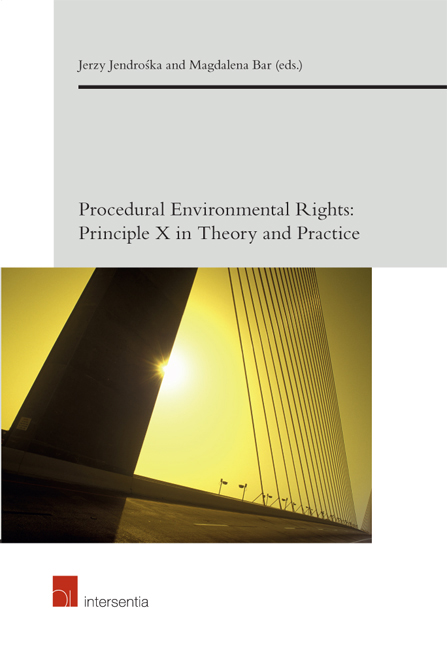Book contents
- Frontmatter
- Contents
- Introduction Procedural Environmental Rights in Theory and Practice
- Procedural Environmental Rights: Status and Developments
- Procedural Environmental Rights in Practice
- Public Participation
- Access to Justice
- Access to Environmental Justice in India: Innovation and Change
- The Scope of the Review in Environment-related Disputes in the Light of the Aarhus Convention and EU Law – Tensions between Effective Judicial Protection and National Procedural Autonomy
- Implementation of the Aarhus Convention through Actio Popularis – Article 9(3) of the Aarhus Convention and Actio Popularis
- Procedural Environmental Rights and Nature Protection
- Procedural Environmental Rights and EIA
- Procedural Environmental Rights and Climate Change
The Scope of the Review in Environment-related Disputes in the Light of the Aarhus Convention and EU Law – Tensions between Effective Judicial Protection and National Procedural Autonomy
from Access to Justice
Published online by Cambridge University Press: 12 October 2018
- Frontmatter
- Contents
- Introduction Procedural Environmental Rights in Theory and Practice
- Procedural Environmental Rights: Status and Developments
- Procedural Environmental Rights in Practice
- Public Participation
- Access to Justice
- Access to Environmental Justice in India: Innovation and Change
- The Scope of the Review in Environment-related Disputes in the Light of the Aarhus Convention and EU Law – Tensions between Effective Judicial Protection and National Procedural Autonomy
- Implementation of the Aarhus Convention through Actio Popularis – Article 9(3) of the Aarhus Convention and Actio Popularis
- Procedural Environmental Rights and Nature Protection
- Procedural Environmental Rights and EIA
- Procedural Environmental Rights and Climate Change
Summary
INTRODUCTION
The entitlement of individuals and NGOs to challenge acts or omissions concerning violations of the environmental legislation through effective judicial mechanisms constitutes an important instrument for ensuring the effective implementation of the environmental law. This can be attributed to a major extent to the particularities of the environmental litigation which arise from the specific nature of the environmental interests in the sense that the latter can either relate to the protection of the “commons” and to the damage caused to nature itself, or are diffuse and fragmented by nature, so that they cannot easily be defended by the individual claimants. Furthermore, another particularity of the environmental litigation is that there is a strong imbalance of power among the actors participating in the judicial proceedings. In this context, it seems to be more urgent in environmental law in relation to other fields of law to create an appropriate framework and to establish the necessary mechanisms, in order to guarantee effective judicial protection for providing just results.
The Aarhus Convention (hereafter AC) has made a significant contribution in terms of enshrining the fundamental procedural right of access to judicial review procedures for challenging the legality of the environment-related decisions, acts and omissions of public authorities or the relevant actions of private persons, blurring thereby the dichotomy between public and individual interests characterizing traditional legal approaches (Article 9). Furthermore, the EU lawmaker revisited certain EU Directives, with the aim of ensuring compliance with the obligations arising from Article 9 of the AC (paras. 1, 2 and 4).
Besides the issues concerning the standing criteria and the remedies provided, another critical issue for ensuring effective judicial protection in environmental disputes relates to what can be contested and the degree to which the courts deal with the arguments brought by the applicants for challenging the relevant acts or omissions (“scope of the review”). Both the relevant provisions of the AC and those of the EU Directives do not contain sufficiently detailed rules on this issue. Subsequently, Member States (hereafter MS) enjoy a certain level of discretion when determining the extent of the judicial review within the framework of the implementation of the AC and the transposition of the relevant provisions of the EU Directives into the national legal systems.
- Type
- Chapter
- Information
- Procedural Environmental RightsPrinciple X in Theory and Practice, pp. 229 - 260Publisher: IntersentiaPrint publication year: 2018
- 1
- Cited by

